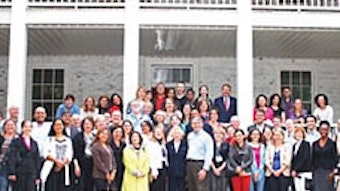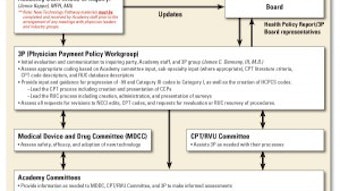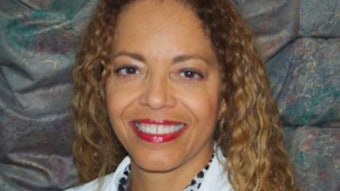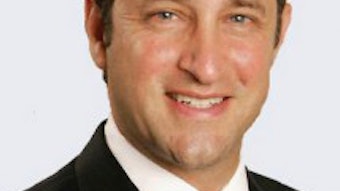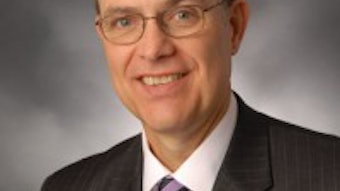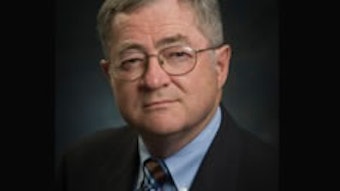Member Profile: Learning and Listening with Earl Singleton, MD
This is the first in an occasional Bulletin series profiling otolaryngologists in later stage and/or no-longer-active practice. The series allows us to hear about and learn from the history, experience, and legacy of those otolaryngologists who have paved the way for others. Dr. Singleton perfectly models an ideal of the “quiet giant” that was coupled with an amazing zest for learning and resulted in influence beyond his small community. His story came to the Bulletin as a result of the readership survey (to be fully reported in our December issue). Jeevan Ramakrishnan, MD, wrote, “My father-in-law recently retired after practicing otolaryngology for 50 years. He spent most of his career in private practice in a small town in north Texas. His story is fascinating.” Dr. Ramakrishnan concluded, “I think it [this and other such stories] might create … the opportunity to get to know one another a little better.” By M. Steele Brown Special to the Bulletin By all accounts, Earl F. Singleton, MD, was one heck of a country doc, but he would’ve been outstanding regardless of locale. A recently retired otolaryngologist-head and neck surgeon and Academy Life-Fellow who spent 39 years in a single specialty private practice in the North Texas border town of Wichita Falls, Dr. Singleton said he never planned to return to practice medicine in his hometown. “I came home to visit my mother and my sister—my dad had died when I was seven—and a doctor who had just opened his ENT practice after getting out of the [U.S.] Air Force at Sheppard Air Force Base there in town, asked me to join him,” Dr. Singleton said. “So he guaranteed me a salary for the first year and we opted to go to work together—thinking that if it worked out that’s great, and if it didn’t, it wouldn’t be a big deal because no anti-compete clauses were in effect. We ended up working together for nearly four decades, so I guess it worked out all right.” Family Ties Regardless of where he ended up, Dr. Singleton may have been genetically predisposed to practice medicine. “Both my dad and his younger brother, my uncle, were physicians,” Dr. Singleton said. “To get through school, they would take turns working and going to school—one would teach while the other one went to (medical) school and they would switch back-and-forth. My dad, who finished first, went into general practice, while my uncle eventually did his residency in ENT in Philadelphia.” “On top of that, my older brother, George Singleton, MD, started the ENT program at the University of Florida (Gainesville) in 1961,” he said. “So while the history only goes back one generation, you get four doctors out of that.” After finishing his undergraduate degree at Rice Institute (now RiceUniversity), Dr. Singleton went to medical school and surgical internship at the University of Texas Medical Branch in Galveston. “I went to medical school in Galveston because it was the only one that would have me, what with my graduating ‘laude-how-come’ from college,” he joked. “I absolutely loved medical school. My wife was pregnant and delivered our first child 36 hours after graduation. So, we decided to stay in Galveston and do a straight surgical internship.” From there, Dr. Singleton completed his year of general surgery at the University of Florida in Gainesville before moving to Boston to do his otolaryngology-head and neck surgery residency at HarvardUniversityMedicalSchool. He said that in medical school he waffled between plastic surgery and otolaryngology-head and neck surgery for a time, but eventually gravitated to otolaryngology because he loved the intricacy of the anatomy of the head and neck. “I thought that a lot of plastic surgery was burn surgery from my medical school exposure and I didn’t want to do that, but I eventually figured out that I could find everything I loved about plastic surgery in ENT,” Dr. Singleton said. “We went to the University of Florida (my wife is from Gainesville) for the year of general surgery and then finished my training in 1969 at the Massachusetts Eye and Ear Infirmary. Harvard was a wonderful training experience for him, with surgical giants such as Harold F. Schuknecht, MD; William Montgomery, MD; Richard Gacek, MD; and Charles Gross, MD, helping him to hone his craft. “He got a wide variety of experience,” according to Jeevan Ramakrishnan, MD, Singleton’s son-in-law and an otolaryngologist-head and neck surgeon in Raleigh, NC. “Harold F. Schuknecht personally taught him how to do stapes surgery.” Top Shelf Country Medicine After completing his residency, Dr. Singleton was in the USAF at Andrews AFB for two years and then was on staff at the University of Michigan for two years, under then-department chief Walter Work, MD, and alongside Roger Boles, MD, former chair of Otolaryngology—Head and Neck Surgery at the University of California, San Francisco, as well as Frank Ritter, MD. As a young attending surgeon at Michigan, he also had the privilege of teaching a veritable Who’s Who group of residents including Michael Johns, MD, the eventual chancellor of EmoryUniversity; Dale Rice, MD, University Southern California department chair and former DrexelUniversity chair of Otolaryngology-Head and Neck Surgery, Robert Sataloff, MD, among others. Then he decided to give up his promising career in academic medicine and open up shop back home in Texas. When they started the practice, Dr. Singleton and his partner were the only two “modern trained” ENTs in Wichita Falls. In a few years they added another associate and the three of them worked together for more than 30 years. “They were go-getters in terms of work and intellectually, so it was really fun,” Singleton said. “We focused mainly on the broad field of general ENT and added facial plastic surgery in there as time went by. We had some training in that field because of our work with the nose, but we also became active in terms of skin cancers, because in our area, there was nobody else doing plastic surgery of that type. “The general surgeons couldn’t do it as well as we did,” he said. “So we ended up working closely with the dermatologists in an office-surgical setting that saved everybody time, money and effort and probably risk, as we were able to do things in the office with minimal sedation. It just ended up being a really neat way to practice country medicine.” Ramakrishnan said that, considering his father-in-law’s expertise, it was more than that. “He didn’t just stick with what he was taught in medical school and residency, he continued to improve and learn,” Ramakrishnan said. “His patients just didn’t know how good a doctor he was and how lucky they were to have this top-notch doctor taking care of them.” Dr. Singleton, who retired to live in the mountains near Waynesville, NC, near his children and grandchildren, said that, as a “country doc,” the physician-patient relationship was an important part of practicing medicine. “That may be family heritage, you know, coming from a family of general practitioners, but I also think that I came through medical school at an extremely practical time, which was ideal for me,” Singleton said. “I always liked to know what people did [for a living]. For one thing, I could usually learn how I could do something better or different—be it fixing something at home or fixing somebody in the operating room—by listening to my patients.” “It helped that I could always extrapolate and figure it out as I went without necessarily having to be taught to do something,” he said. “I might have picked up a trick from a plumber or other field, on how to do something different and often better.” Dr. Singleton said that listening also helped him decide when not to do some things as well. “Those conversations usually gave me an insight as to what might be playing a role in what was going on, even if we are just talking about what they do for a living,” he said. “I think as a part of that, I got to know my patients and their family dynamics. “And I’m not trying to be a psychiatrist, but I think that there are psychological aspects to so many ailments, even including the common cold at times, and I think some of those issues have always played a role in how I treated patients and lent me a degree of understanding that formed how I practiced. I found that many times, just telling somebody that their response was normal was very helpful.” Dr. Singleton said the isolated location of Wichita Falls—roughly 150 miles south of Oklahoma City, Okla. and 130 miles west of Dallas—and some really good timing contributed to his amazing experience. “There were no plastic surgeons, neurologists, pulmonologists, gastroenterologists, oncologists or other specialties that overlapped with general ENT,” he said. “We did everything we were trained to do and then some. You had to learn how to problem-solve and make it happen; and it was amazing if you went a day without learning something.” “There was one neurosurgeon in town when I got there who I was able to work with very closely, and I started doing pituitaries with him,” he said. “To bring that kind of thing in to a town of 100,000 people part way between Dallas and Amarillo was pretty extraordinary. Looking back, I feel like we had as many resources as anybody around [in the field] and more opportunity than a lot, I’d like to think. “One has to remember that this story began in the day when we used head mirrors for exams, tomography was the new thing and CT’s, MRI’s, flexible scopes and many of lab tests, antibiotics etc. were not around yet. It was truly a fun and great time to have practiced medicine when we pretty well kept up with all the changes and expertise.” They had a group that expanded to five ENT doctors that continues to serve that community and otolaryngology-head and neck surgery well. Dr. Singleton feels one of the important things is that we flourish when we are happy. For us to be happy, we must create and seek well as much as we can—this includes family, office and hospital staff, and patients as well as in our other associates and acquaintances. As we often ask our patients “How are you doing?” It’s important to also ask that of our families, staff, and associates. It certainly lets them know that we care, which adds to their happiness and it is often returned several fold to you, the physician.
This is the first in an occasional Bulletin series profiling otolaryngologists in later stage and/or no-longer-active practice. The series allows us to hear about and learn from the history, experience, and legacy of those otolaryngologists who have paved the way for others. Dr. Singleton perfectly models an ideal of the “quiet giant” that was coupled with an amazing zest for learning and resulted in influence beyond his small community. His story came to the Bulletin as a result of the readership survey (to be fully reported in our December issue). Jeevan Ramakrishnan, MD, wrote, “My father-in-law recently retired after practicing otolaryngology for 50 years. He spent most of his career in private practice in a small town in north Texas. His story is fascinating.” Dr. Ramakrishnan concluded, “I think it [this and other such stories] might create … the opportunity to get to know one another a little better.”
By M. Steele Brown Special to the Bulletin
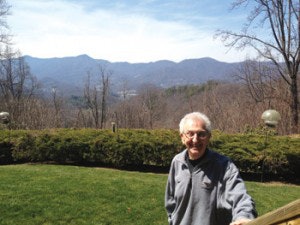 Dr. Singleton in his backyard in Waynesville, NC.
Dr. Singleton in his backyard in Waynesville, NC.By all accounts, Earl F. Singleton, MD, was one heck of a country doc, but he would’ve been outstanding regardless of locale.
A recently retired otolaryngologist-head and neck surgeon and Academy Life-Fellow who spent 39 years in a single specialty private practice in the North Texas border town of Wichita Falls, Dr. Singleton said he never planned to return to practice medicine in his hometown.
“I came home to visit my mother and my sister—my dad had died when I was seven—and a doctor who had just opened his ENT practice after getting out of the [U.S.] Air Force at Sheppard Air Force Base there in town, asked me to join him,” Dr. Singleton said. “So he guaranteed me a salary for the first year and we opted to go to work together—thinking that if it worked out that’s great, and if it didn’t, it wouldn’t be a big deal because no anti-compete clauses were in effect. We ended up working together for nearly four decades, so I guess it worked out all right.”
Family Ties
Regardless of where he ended up, Dr. Singleton may have been genetically predisposed to practice medicine.
“Both my dad and his younger brother, my uncle, were physicians,” Dr. Singleton said. “To get through school, they would take turns working and going to school—one would teach while the other one went to (medical) school and they would switch back-and-forth. My dad, who finished first, went into general practice, while my uncle eventually did his residency in ENT in Philadelphia.”
“On top of that, my older brother, George Singleton, MD, started the ENT program at the University of Florida (Gainesville) in 1961,” he said. “So while the history only goes back one generation, you get four doctors out of that.”
After finishing his undergraduate degree at Rice Institute (now RiceUniversity), Dr. Singleton went to medical school and surgical internship at the University of Texas Medical Branch in Galveston.
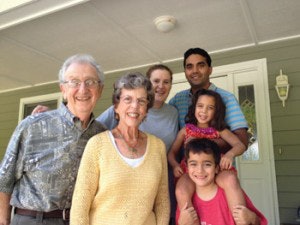 Dr. Singleton, Beverly Singleton (wife), Suzanne Ramakrishnan (daughter), Jeevan Ramakrishnan (son-in-law), Kaia Ramakrishnan (granddaughter), and Montana Ramakrishnan (grandson)
Dr. Singleton, Beverly Singleton (wife), Suzanne Ramakrishnan (daughter), Jeevan Ramakrishnan (son-in-law), Kaia Ramakrishnan (granddaughter), and Montana Ramakrishnan (grandson)“I went to medical school in Galveston because it was the only one that would have me, what with my graduating ‘laude-how-come’ from college,” he joked. “I absolutely loved medical school. My wife was pregnant and delivered our first child 36 hours after graduation. So, we decided to stay in Galveston and do a straight surgical internship.”
From there, Dr. Singleton completed his year of general surgery at the University of Florida in Gainesville before moving to Boston to do his otolaryngology-head and neck surgery residency at HarvardUniversityMedicalSchool. He said that in medical school he waffled between plastic surgery and otolaryngology-head and neck surgery for a time, but eventually gravitated to otolaryngology because he loved the intricacy of the anatomy of the head and neck.
“I thought that a lot of plastic surgery was burn surgery from my medical school exposure and I didn’t want to do that, but I eventually figured out that I could find everything I loved about plastic surgery in ENT,” Dr. Singleton said. “We went to the University of Florida (my wife is from Gainesville) for the year of general surgery and then finished my training in 1969 at the Massachusetts Eye and Ear Infirmary.
Harvard was a wonderful training experience for him, with surgical giants such as Harold F. Schuknecht, MD; William Montgomery, MD; Richard Gacek, MD; and Charles Gross, MD, helping him to hone his craft. “He got a wide variety of experience,” according to Jeevan Ramakrishnan, MD, Singleton’s son-in-law and an otolaryngologist-head and neck surgeon in Raleigh, NC. “Harold F. Schuknecht personally taught him how to do stapes surgery.”
Top Shelf Country Medicine
After completing his residency, Dr. Singleton was in the USAF at Andrews AFB for two years and then was on staff at the University of Michigan for two years, under then-department chief Walter Work, MD, and alongside Roger Boles, MD, former chair of Otolaryngology—Head and Neck Surgery at the University of California, San Francisco, as well as Frank Ritter, MD. As a young attending surgeon at Michigan, he also had the privilege of teaching a veritable Who’s Who group of residents including Michael Johns, MD, the eventual chancellor of EmoryUniversity; Dale Rice, MD, University Southern California department chair and former DrexelUniversity chair of Otolaryngology-Head and Neck Surgery, Robert Sataloff, MD, among others.
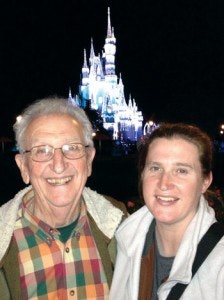 Dr. Singleton and Suzanne Ramakrishnan (daughter).
Dr. Singleton and Suzanne Ramakrishnan (daughter).Then he decided to give up his promising career in academic medicine and open up shop back home in Texas. When they started the practice, Dr. Singleton and his partner were the only two “modern trained” ENTs in Wichita Falls. In a few years they added another associate and the three of them worked together for more than 30 years.
“They were go-getters in terms of work and intellectually, so it was really fun,” Singleton said. “We focused mainly on the broad field of general ENT and added facial plastic surgery in there as time went by. We had some training in that field because of our work with the nose, but we also became active in terms of skin cancers, because in our area, there was nobody else doing plastic surgery of that type.
“The general surgeons couldn’t do it as well as we did,” he said. “So we ended up working closely with the dermatologists in an office-surgical setting that saved everybody time, money and effort and probably risk, as we were able to do things in the office with minimal sedation. It just ended up being a really neat way to practice country medicine.”
Ramakrishnan said that, considering his father-in-law’s expertise, it was more than that.
“He didn’t just stick with what he was taught in medical school and residency, he continued to improve and learn,” Ramakrishnan said. “His patients just didn’t know how good a doctor he was and how lucky they were to have this top-notch doctor taking care of them.”
Dr. Singleton, who retired to live in the mountains near Waynesville, NC, near his children and grandchildren, said that, as a “country doc,” the physician-patient relationship was an important part of practicing medicine.
“That may be family heritage, you know, coming from a family of general practitioners, but I also think that I came through medical school at an extremely practical time, which was ideal for me,” Singleton said. “I always liked to know what people did [for a living]. For one thing, I could usually learn how I could do something better or different—be it fixing something at home or fixing somebody in the operating room—by listening to my patients.”
“It helped that I could always extrapolate and figure it out as I went without necessarily having to be taught to do something,” he said. “I might have picked up a trick from a plumber or other field, on how to do something different and often better.”
Dr. Singleton said that listening also helped him decide when not to do some things as well.
“Those conversations usually gave me an insight as to what might be playing a role in what was going on, even if we are just talking about what they do for a living,” he said. “I think as a part of that, I got to know my patients and their family dynamics.
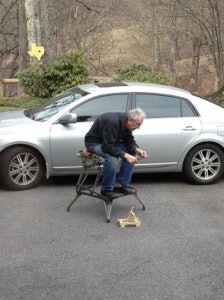
Dr. Singleton said the isolated location of Wichita Falls—roughly 150 miles south of Oklahoma City, Okla. and 130 miles west of Dallas—and some really good timing contributed to his amazing experience. “There were no plastic surgeons, neurologists, pulmonologists, gastroenterologists, oncologists or other specialties that overlapped with general ENT,” he said. “We did everything we were trained to do and then some. You had to learn how to problem-solve and make it happen; and it was amazing if you went a day without learning something.”
“There was one neurosurgeon in town when I got there who I was able to work with very closely, and I started doing pituitaries with him,” he said. “To bring that kind of thing in to a town of 100,000 people part way between Dallas and Amarillo was pretty extraordinary. Looking back, I feel like we had as many resources as anybody around [in the field] and more opportunity than a lot, I’d like to think.
“One has to remember that this story began in the day when we used head mirrors for exams, tomography was the new thing and CT’s, MRI’s, flexible scopes and many of lab tests, antibiotics etc. were not around yet. It was truly a fun and great time to have practiced medicine when we pretty well kept up with all the changes and expertise.”
They had a group that expanded to five ENT doctors that continues to serve that community and otolaryngology-head and neck surgery well.
Dr. Singleton feels one of the important things is that we flourish when we are happy. For us to be happy, we must create and seek well as much as we can—this includes family, office and hospital staff, and patients as well as in our other associates and acquaintances. As we often ask our patients “How are you doing?” It’s important to also ask that of our families, staff, and associates. It certainly lets them know that we care, which adds to their happiness and it is often returned several fold to you, the physician.



